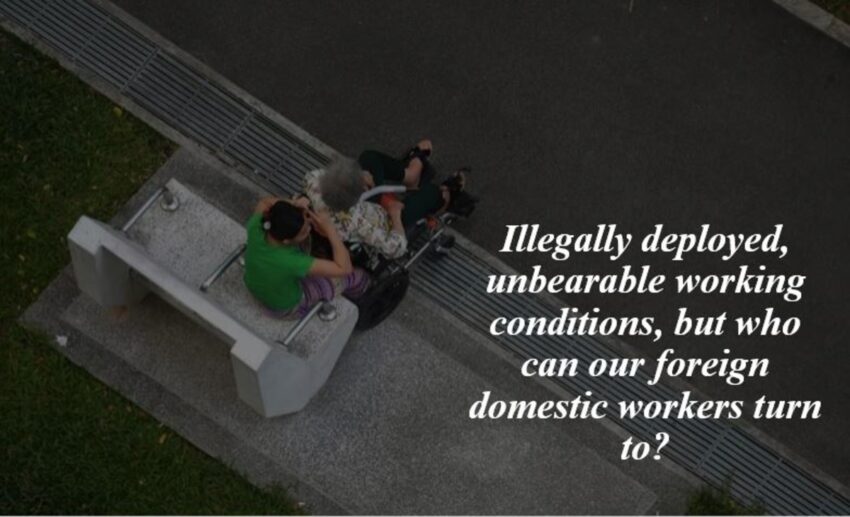Shin Min Daily News recently highlighted a case about a Foreign Domestic Worker (FDW) who was illegally deployed to work at multiple locations by her employer. According to reports, this FDW had to perform the full extent of domestic work at four different households, and on top of that, doubled up as a cleaner in an office!
After the employer found out a report had been made to the authority with the help of Non-Governmental Organisation, the Centre for Domestic Employees (CDE), the employer tried to repatriate the FDW. Thankfully, CDE intercepted the repatriation and eventually found her a new employer!
So… what constitutes illegal deployment?
Well, it is illegal deployment if you allow your helper to perform household chores at another home. In reality, more often than not, the lines are blurred.
Under current regulations, FDWs can be deployed with either children or elderly persons to the homes of close family members of their employers in the day so they can continue to provide care to their charges while their employers are at work. Yes, this is allowed as long as FDWs accept the arrangements. They must also receive enough food and rest while they are there. But wait, do you know that they are not allowed to perform household chores in the homes of the family members?
Apparently many employers are “not aware”. FDWs ordered to clean more than one home rarely blow the whistle on their employers for fear of “creating trouble” and potential repercussions.
Now, where can our domestic helpers get help? Who can they turn to?
Non-Governmental Organisations (NGOs) like the Foreign Domestic Worker Association for Social Support and Training (FAST) and the Centre for Domestic Employees (CDE) deal with countless complaints of illegal deployment from FDWs where they claimed to have been illegally deployed to work at multiple households or made to perform non-domestic chores! Other concerns that these organisations assist FDWs with? Non-payment / short payment of salary. The CDE is a centre set up to bolster support for distressed workers. They offer employment-related advice, educate them on their rights and responsibilities, and engage them with meaningful activities. Their core work revolves around assisting FDWs – in all possible ways.
CDE’s Executive Director, Mr Shamsul Kamar shared his view with Shin Min Daily News recently on how employers will stand to lose more if their FDWs are overworked or gets injured. He also encouraged employers and FDWs who are unsure about the employment rules to reach out to CDE at the 24-hour helpline 1800 2255 233 for advice.

There needs to be clear demarcation of what are household chores, and what are non-domestic chores.
“Can my helper clean the windows while they are at Ah Ma’s house with my child?” “Can she mop the floor there?”
The boundaries between what chores are permitted and what aren’t are often blurred.
Mr Shamsul Kamar shed more light on the issue of illegal deployment in a commentary piece by ChannelNewsAsia.
Key points Mr Shamsul made:
1) Illegal deployment of FDWs is not allowed, unless they are deployed to the homes of close family members to care for the young or the elderly.
2) It may not always be easy to differentiate neatly between what is considered household chores in the homes of the family members FDWs should not undertake, from incidental chores that might arise out of caregiving duties.
3) Employers should list down in the employment contract clearly on the type of incidental work to be performed in the homes of close family members during caregiving of the charges after mutual agreement.
4) Clear communications will benefit all parties by reducing misunderstanding and pre-empting accusations that could lead to the eventual breakdown of employment relationships.
5) FDWs should never be deployed to perform domestic work in multiple households, regardless of whether FDWs agree to such arrangements or receive monetary inducement to do so.
6) The authorities need to take a strong stance against employers who deploy FDWs to perform non-domestic work.
Uplifting the Welfare of our FDWs
In 2019, the CDE handled a total of 1,951 cases, up from 1,358 in 2018. Welfare issues for this group of workers are rising and our FDWs need more help. The CDE helps to quickly spot welfare issues on the ground from abuse, to salary and employment conflicts that FDWs might face, and offer prompt assistance where possible.
Indeed heartening to see organisations as such caring for and uplifting the welfare of our FDWs!
Cover image via
